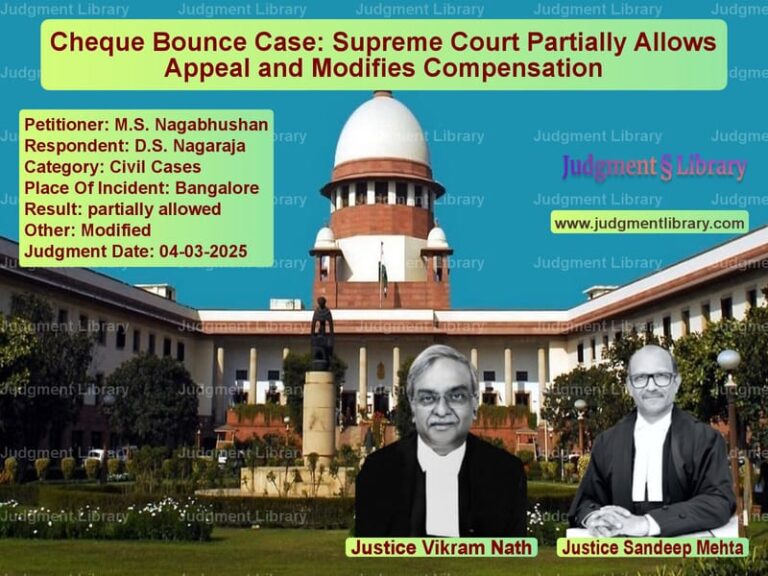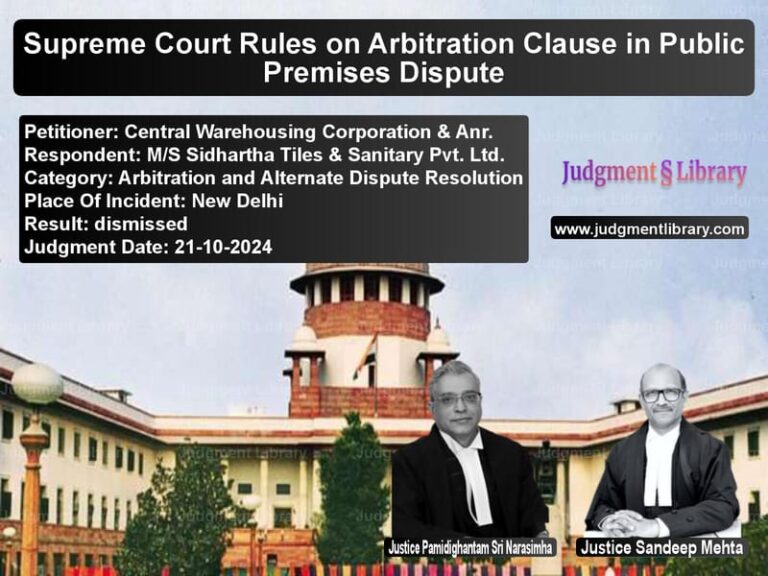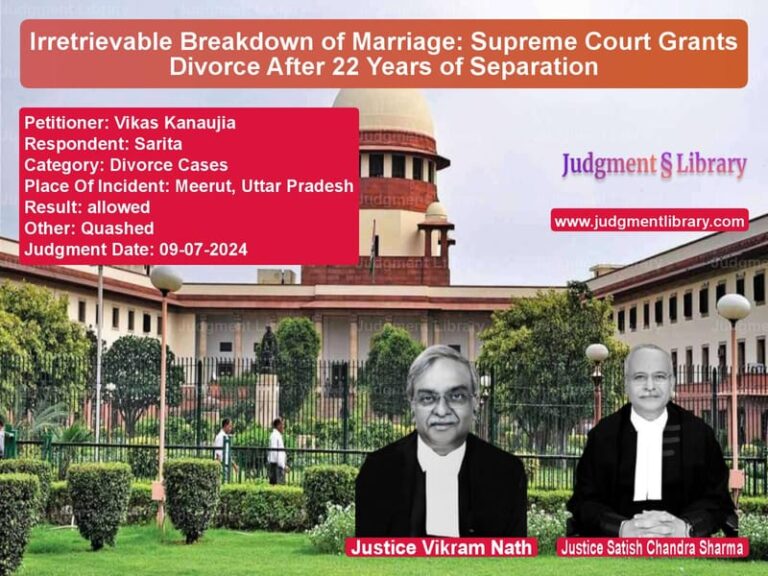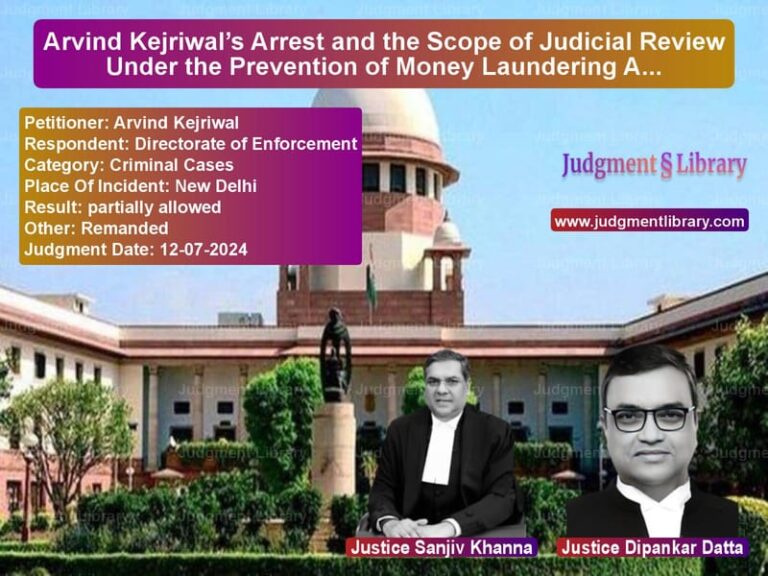Dismissal of Police Constable for Drunken Misconduct: Supreme Court Reinstates Termination
The case of State of Uttarakhand & Ors. v. Prem Ram deals with the dismissal of a police constable for serious misconduct involving drunkenness and misbehavior with the public. The Supreme Court, in its judgment dated March 15, 2019, upheld the dismissal order and set aside the High Court’s decision that had converted the dismissal into compulsory retirement.
This judgment highlights the significance of discipline in the police force and establishes that the judiciary should exercise restraint in interfering with departmental disciplinary actions when misconduct is clearly proven.
Case Background
The respondent, Prem Ram, joined the Uttarakhand Police in 1987 as a constable and was posted in Pithoragarh. On November 1, 2006, while posted at Berinag, he was allegedly found in an inebriated state and misbehaving with the public. He was brought to the police station and confined to the barracks. A medical examination confirmed that he was under the influence of alcohol.
A charge sheet was issued to him on February 24, 2007, and a disciplinary inquiry was conducted. The inquiry officer found him guilty of misconduct. Based on these findings, a show cause notice was issued on May 3, 2007. The respondent submitted his reply on May 8, 2007. However, the Superintendent of Police, Pithoragarh, passed an order of dismissal on May 16, 2007, citing gross indiscipline and misconduct.
The respondent challenged his dismissal through multiple appeals and writ petitions, leading to a prolonged legal battle.
Legal Proceedings
Following his dismissal, the respondent filed a writ petition before the Uttarakhand High Court. On April 21, 2010, the High Court disposed of the petition and directed him to exhaust his statutory remedy by filing an appeal.
His departmental appeal was dismissed by the Inspector General of Police, Kumaon Range, on August 28, 2010. A further revision was rejected by the Additional Director General of Police on May 19, 2011.
Subsequently, he filed a fresh writ petition challenging the rejection of his revision application. A single judge of the High Court dismissed the writ petition on September 15, 2014, upholding the validity of the dismissal.
However, upon filing a Special Appeal before a Division Bench, the High Court, on October 30, 2014, ruled in his favor and converted his dismissal into compulsory retirement. The High Court reasoned that:
- The respondent had served in the police force for 25 years without any prior major misconduct.
- The disciplinary authority should not have considered past conduct while determining punishment.
- The punishment of dismissal was excessive and disproportionate.
The Uttarakhand government challenged this decision before the Supreme Court.
Petitioner’s Arguments
The State of Uttarakhand, represented by its counsel, argued:
- The respondent’s misconduct was grave, involving public intoxication and misbehavior, which is unacceptable for a police officer.
- The medical report conclusively established that he was under the influence of alcohol while on duty.
- Discipline in the police force requires strict action against errant officers.
- The Division Bench of the High Court erred in interfering with the disciplinary authority’s decision, especially when a single judge had already upheld the dismissal.
- Converting dismissal into compulsory retirement was an unjustified interference in the punishment imposed by the employer.
Respondent’s Arguments
The respondent, Prem Ram, who did not appear before the Supreme Court, had previously contended:
- The punishment of dismissal was excessive, considering his 25 years of service.
- His past record did not contain any major disciplinary infractions.
- The High Court was justified in modifying the punishment to compulsory retirement, which was a more proportionate penalty.
Supreme Court’s Observations and Ruling
The Supreme Court analyzed the seriousness of the charges against the respondent and found that his dismissal was justified. It observed:
“The charge against the respondent was of a serious act of misconduct involving drunkenness and misbehavior with the public. The fact of intoxication was duly proved in the medical report.”
The Court criticized the High Court’s decision to interfere with the dismissal order:
“Having regard to the seriousness of the charge of misconduct and the fact that the respondent was a member of the police service, we find no justification for the High Court to interfere with the order of dismissal.”
It held that the Single Judge was correct in dismissing the respondent’s writ petition and that the Division Bench had erred in altering the punishment:
“The Division Bench has erred in allowing the Special Appeal. The order of the learned Single Judge did not suffer from any error of fact or law.”
Consequently, the Supreme Court:
- Set aside the High Court’s order modifying the punishment.
- Restored the original dismissal order issued by the Superintendent of Police.
- Maintained that there was no justification for reducing the punishment.
Conclusion
This judgment upholds the principle that law enforcement officers must maintain the highest standards of discipline. The key takeaways from this ruling are:
- Drunkenness and misbehavior while on duty are serious offenses for a police officer and warrant strict disciplinary action.
- The judiciary should not interfere with legally sound disciplinary actions unless there is a gross miscarriage of justice.
- Once an officer is found guilty of gross misconduct, mitigating factors like past service record cannot justify reducing the penalty.
- High Court decisions modifying disciplinary penalties must be based on strong legal grounds and should not interfere with administrative authority without justification.
By reinstating the dismissal, the Supreme Court reinforced the need for stringent discipline in the police force, ensuring that erring officers face appropriate consequences for their actions.
Petitioner Name: State of Uttarakhand & Ors..Respondent Name: Prem Ram.Judgment By: Justice Dhananjaya Y Chandrachud, Justice Hemant Gupta.Place Of Incident: Pithoragarh, Uttarakhand.Judgment Date: 15-03-2019.
Don’t miss out on the full details! Download the complete judgment in PDF format below and gain valuable insights instantly!
Download Judgment: State of Uttarakhand vs Prem Ram Supreme Court of India Judgment Dated 15-03-2019.pdf
Direct Downlaod Judgment: Direct downlaod this Judgment
See all petitions in Termination Cases
See all petitions in Disciplinary Proceedings
See all petitions in Public Sector Employees
See all petitions in Judgment by Dhananjaya Y Chandrachud
See all petitions in Judgment by Hemant Gupta
See all petitions in allowed
See all petitions in Modified
See all petitions in supreme court of India judgments March 2019
See all petitions in 2019 judgments
See all posts in Service Matters Category
See all allowed petitions in Service Matters Category
See all Dismissed petitions in Service Matters Category
See all partially allowed petitions in Service Matters Category







